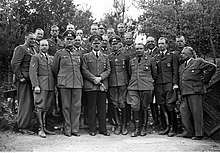Alfred Jodl
Alfred Josef Ferdinand Jodl (![]()
Generaloberst Alfred Jodl | |
|---|---|
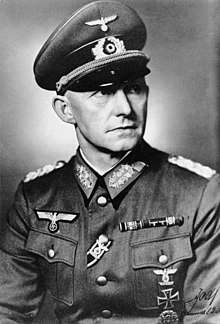 Jodl in 1940 | |
| Chief of the Operations Staff for the Armed Forces High Command | |
| In office 1 September 1939 – 8 May 1945 | |
| Deputy | Walter Warlimont |
| Chief of the General Staff (acting) for the Army High Command | |
| In office 13 May 1945 – 23 May 1945 | |
| Preceded by | Wilhelm Keitel |
| Succeeded by | Office abolished |
| Personal details | |
| Born | Alfred Josef Ferdinand Jodl 10 May 1890 Würzburg, Bavaria, German Empire |
| Died | 16 October 1946 (aged 56) Nuremberg, Bavaria, Allied-occupied Germany |
| Cause of death | Execution |
| Spouse(s) | |
| Relations | Ferdinand Jodl (brother) |
| Signature |  |
| Military service | |
| Allegiance | |
| Branch/service | German Army |
| Years of service | 1910–1945 |
| Rank | Generaloberst |
| Battles/wars | World War I
World War II |
| Awards | Knight's Cross of the Iron Cross |
After the war, Jodl was indicted on charges of conspiracy to commit crimes against peace; planning, initiating and waging wars of aggression; war crimes; and crimes against humanity at the Allied-organised Nuremberg trials. The principal charges against him related to his signature of the criminal Commando and Commissar Orders. Found guilty on all charges, he was sentenced to death and executed in Nuremberg in 1946.
Early life and career
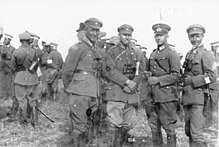
Alfred Jodl was educated at a military Cadet School in Munich, from which he graduated in 1910. Ferdinand Jodl, who would also become an Army General, was his younger brother. The philosopher and psychologist Friedrich Jodl at the University of Vienna was his uncle.[3]
From 1914 to 1916 he served with a Battery unit on the Western Front, being awarded the Iron Cross for gallantry in November 1914, and being wounded in action. In 1917 he served briefly on the Eastern Front before returning to the West as a Staff Officer. In 1918 he again won the Iron Cross for gallantry in action. After the defeat of the German Empire in 1918, he continued his career as a professional soldier with the much-reduced German Army (Reichswehr).[4] Jodl married twice: in 1913, and (after becoming a widower) in 1944.[5]
World War II
Jodl's appointment as a major in the operations branch of the Truppenamt in the Army High Command in the last years of the Weimar Republic put him under command of General Ludwig Beck. In September 1939 Jodl first met Adolf Hitler. In the build-up to the Second World War, Jodl was nominally assigned as a commander of the 44th Division from October 1938 to August 1939 during the Anschluss.
Jodl was chosen by Hitler to be Chief of Operation Staff of the newly formed Oberkommando der Wehrmacht (OKW) on 23 August 1939, just prior to the German invasion of Poland.[6] Jodl acted as a Chief of Staff during the swift invasion of Denmark and Norway. Following the Fall of France Jodl was optimistic of Germany's success over Britain, on 30 June 1940 writing "The final German victory over England is now only a question of time."[7]
Jodl signed the Commissar Order of 6 June 1941 (in which Soviet political commissars were to be shot) and the Commando Order of 28 October 1942 (in which Allied commandos, including properly uniformed soldiers as well as combatants wearing civilian clothes, such as Maquis and partisans, were to be executed immediately without trial if captured behind German lines).
Jodl spent most of the war at the Wolf's Lair, Hitler's forward command post in East Prussia. On 1 February 1944, Jodl was promoted to the rank of Generaloberst (Colonel General). Jodl was among those slightly injured during the 20 July plot of 1944 against Hitler where he suffered a concussion from the explosion.[8] Jodl was awarded the Knight's Cross of the Iron Cross by Admiral Karl Dönitz, Hitler's successor, on 6 May.[9]
At the end of World War II in Europe, Jodl signed the German Instrument of Surrender on 7 May 1945 in Reims as the representative of Dönitz.[10]
Trial and conviction
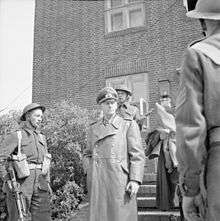
Jodl was arrested by British troops on 23 May 1945 and transferred to Flensburg POW camp and later put before the International Military Tribunal at the Nuremberg trials. Jodl was accused of conspiracy to commit crimes against peace; planning, initiating and waging wars of aggression; war crimes; and crimes against humanity. The principal charges against him related to his signature of the Commando Order and the Commissar Order, both of which ordered that certain classes of prisoners of war were to be summarily executed upon capture. When confronted with the 1941 mass shootings of Soviet POWs, Jodl claimed the only prisoners shot were "not those that could not, but those that did not want to walk."[11]
Additional charges at his trial included unlawful deportation and abetting execution. Presented as evidence was his signature on an order that transferred Danish citizens, including Jews, to Nazi concentration camps. Although he denied his role in this activity of the regime, the court sustained his complicity based on the evidence it had examined, with the French judge, Henri Donnedieu de Vabres, dissenting.
His wife Luise attached herself to her husband's defence team.[12] Subsequently, interviewed by Gitta Sereny, researching her biography of Albert Speer, Luise alleged that in many instances the Allied prosecution made charges against Jodl based on documents that they refused to share with the defence. Jodl nevertheless proved that some of the charges made against him were untrue, such as the charge that he had helped Hitler gain control of Germany in 1933.[13]
Jodl pleaded not guilty "before God, before history and my people". Found guilty on all four charges, he was hanged at Nuremberg Prison on 16 October 1946.[14] Jodl's last words were reportedly "Ich grüße Dich, mein ewiges Deutschland"—"I greet you, my eternal Germany."[15]
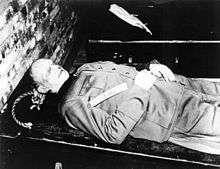
His remains, like those of the other nine executed men and Hermann Göring (who had committed suicide prior to his scheduled execution), were cremated at Ostfriedhof and the ashes were scattered in the Wentzbach, a small tributary of the River Isar[16][17][18] to prevent the establishment of a permanent burial site which might be enshrined by nationalist groups.
On 28 February 1953, a West German denazification court declared the now-deceased Jodl not guilty of breaking international law.[19] This not guilty declaration was revoked by the Minister of Political Liberation for Bavaria on 3 September 1953, following objections from the United States.[20]
Decorations
- Iron Cross (1914) 2nd Class (20 November 1914) & 1st Class (3 May 1918)[21]
- Clasp to the Iron Cross (1939) 2nd Class (30 September 1939) & 1st Class (23 December 1939)[21]
- Knight's Cross of the Iron Cross with Oak Leaves
References
Notes
- Tofahrn 2008, pp. 129–130.
- O'Keeffe 2013, p. 172.
- Jodl, Alfred (1946). "A Short Historical Consideration of German War Guilt" (PDF). In Office of United States Chief of Counsel For Prosecution of Axis Criminality (ed.). Nazi Conspiracy and Aggression, Volume VIII. Washington: U.S. Government Printing Office. p. 663.
- Görlitz 1989, p. 155.
- Görlitz 1989, p. 161.
- "Alfred Jodl | German general". Encyclopedia Britannica. Retrieved 10 February 2018.
- Shirer 1990, p. 758.
- "Alfred Jodl". Alfred Jodl Second World War. Retrieved 14 January 2020.
- Scherzer 2007, p. 146.
- Shepherd 2016, p. 519.
- Crowe 2013, p. 87.
- Jodl case for the defence
- Sereny 1995, p. 578.
- umkc.edu Archived 20 May 2009 at the Wayback Machine
- Maser 2005, pp. 349–350.
- Thomas Darnstädt (2005), "Ein Glücksfall der Geschichte", Der Spiegel, 13 September (14), p. 128
- Manvell 2011, p. 393.
- Overy 2001, p. 205.
- Davidson 1997, p. 363.
- Scheurig 1997, p. 428.
- Thomas 1997, p. 328.
Bibliography
- Crowe, David M. (2013). Crimes of State Past and Present: Government-Sponsored Atrocities and International Legal Responses. Routledge. ISBN 978-1317986829.CS1 maint: ref=harv (link)
- Davidson, Eugene (1997). The Trial of the Germans. University of Missouri Press. ISBN 0-8262-1139-9.CS1 maint: ref=harv (link)
- Görlitz, Walter (1989). "Keitel, Jodl and Warlimont". In Barnett, Correlli (ed.). Hitler's Generals. London: Weidenfeld and Nicolson. ISBN 978-0802139948.CS1 maint: ref=harv (link)
- Heiber, Helmut; Glantz, David M., eds. (2004). Hitler and his generals. Military Conferences 1942–1945. New York: Enigma Books. ISBN 1-929631-28-6.CS1 maint: ref=harv (link)
- Maser, Werner (2005). Nürnberg: Tribunal der Sieger [Nuremberg: Trial of Victors] (in German). Verlag Antaios. ISBN 978-3-935063-37-1.CS1 maint: ref=harv (link)
- O'Keeffe, William J. (2013). A Literary Occupation: Responses of German writers in service in occupied Europe. Amsterdam: Rodopi. ISBN 978-9042037700. Retrieved 1 December 2018.CS1 maint: ref=harv (link)
- Scherzer, Veit (2007). Die Ritterkreuzträger 1939–1945 Die Inhaber des Ritterkreuzes des Eisernen Kreuzes 1939 von Heer, Luftwaffe, Kriegsmarine, Waffen-SS, Volkssturm sowie mit Deutschland verbündeter Streitkräfte nach den Unterlagen des Bundesarchives [The Knight's Cross Bearers 1939–1945 The Holders of the Knight's Cross of the Iron Cross 1939 by Army, Air Force, Navy, Waffen-SS, Volkssturm and Allied Forces with Germany According to the Documents of the Federal Archives] (in German). Jena, Germany: Scherzers Militaer-Verlag. ISBN 978-3-938845-17-2.CS1 maint: ref=harv (link)
- Scheurig, Bodo (1997). Alfred Jodl. Gehorsam und Verhängnis. Berlin: Propyläen. ISBN 3-549-07228-7.CS1 maint: ref=harv (link)
- Sereny, Gitta (1995). Albert Speer: His Battle with Truth. New York: Knopf. ISBN 0-394-52915-4.CS1 maint: ref=harv (link)
- Shepherd, Ben (2016). Hitler's Soldiers: The German Army in the Third Reich. Yale University Press. ISBN 9780300179033.CS1 maint: ref=harv (link)
- Shirer, William (1990). The Rise and Fall of the Third Reich: A History of Nazi Germany. Simon & Schuster. ISBN 0-671-72868-7.CS1 maint: ref=harv (link)
- Thomas, Franz (1997). Die Eichenlaubträger 1939–1945 Band 1: A–K [The Oak Leaves Bearers 1939–1945 Volume 1: A–K] (in German). Osnabrück, Germany: Biblio-Verlag. ISBN 978-3-7648-2299-6.CS1 maint: ref=harv (link)
- Tofahrn, Klaus W. (2008). Das Dritte Reich und der Holocaust (in German). Peter Lang GmbH. ISBN 978-3631577028. Retrieved 8 October 2019.CS1 maint: ref=harv (link)
External links
- Alfred Jodl—United States Holocaust Memorial Museum
- Newspaper clippings about Alfred Jodl in the 20th Century Press Archives of the ZBW
